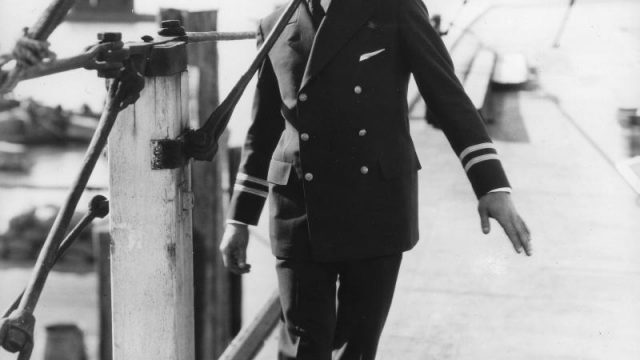The last twenty minutes of Steamboat Bill Jr. are some of the greatest moments of stuntmanship and physical prowess in the history of the movies. Keaton seemingly leaps from building to building like a very put upon squirrel, wrestles with ropes, dives straight into a flood, and most famously stands straight as the front of a house collapses around his body that stands in a doorway, mere inches from his person. And he does this twice. He could’ve died if he’d moved a few inches, crushed by hubris, but he didn’t. He just had a gift for this.
Buster Keaton was an icon whose acting work could, if he’d chosen, had displayed more cockiness in his persona a la Tom Cruise, another actor who has relished his ability to do terrifying feats with the physical form, but his characters were never like that. Bill Jr. is hapless, confused, a little bit of a dreamer, and most importantly to the narrative here he’s effeminate (Keaton cuts an intriguingly androgynous figure, all cheekbones and a lean torso probably hiding a stuntman’s muscle). Keaton’s characters here and in Sherlock Jr. most pointedly are not quite of their masculine world, their heads in the clouds, reacting to the events around them with bewilderment that something happened at all. As a person on the spectrum both of and apart from traditional masculinity its this aspect of Keaton I most personally relate to: a person grasping for a role in a universe of action.
Of course Keaton always finds one – after all these are comedies and they need a solid happy ending (a wedding and all’s well that ends well). In Steamboat Bill Jr. the conflict here mostly comes from Bill Jr’s father, steamboat owner Bill Canfield, none too pleased his son is wearing a beret and is (gasp!) a college student in a time when that could hold a whole different meaning. Bill’s threatened by businessman James King and his own rather awesome new steamboat and was hoping a big strapping guy could help him out. But not only is Bill Jr. a pasty wimp, but the kid’s in love with King’s daughter Kitty! You can almost hear Krusty The Clown’s father: “I have no SON!” The rest of the plot comes from King and Canfield Sr’s attempts to break the two up and Bill Jr. romancing Kitty, albeit haphazardly.
The film was Keaton’s last independent film – he did uncredited co-direction and script work on it and it’s certainly his film more than anybody else’s; once he moved to the studios he only made one more movie with this kind of creative control, The Cameraman. Yet Steamboat Bill Jr. was a box office failure, not embraced til years later. To be frank I can kind of see why that might be the case: one of the problems with the first hour or so is that it doesn’t have as many laughs as it needs, heavier on plot than spectacle. The movie at worst is a little slight: we’re not given a strong enough reason to really care about Bill Sr. or Jr. beyond that they’re just around. Bill Sr. in particular is an ass, at one point ordering his adult son (who’s visibly crushed) to go back to Boston because he’s so disappointed with how he’s turned out.
It’s one of the points in the film that has aged more than others, along with one joke that’s not as explicitly racist as other movies of the time, but its…its bad. Steamboat Bill Jr. is rooted in a period of history where your parents had more sway over who you were dating and when going to college wasn’t bizarrely necessary to get a job. One has to take the period setting as it is but even then I think the plot isn’t quite doing the leg work. Its the dazzling final fifteen minutes that make the movie worth seeing, as if we’ve been waiting fifty minutes for a champagne bottle to uncork then it shoots into the air in an exuberant fit. We are watching a brilliant man near or at his peak in a great set piece, the physical and cinematic equivalent of Bowie (who was at one point set to play Keaton) shouting into the void in “Heroes”. It’s been ninety years yet nothing at all has become dated about witnessing a human being doing what they were born to do, showing unbelievable ability. Keaton’s characters were dreamers sure, but once they were in the midst of chaos and danger they demonstrate their active selves, their pure physical presence. Its that contradiction that might have made Buster Keaton such a strange, enduring member of the cinema.

